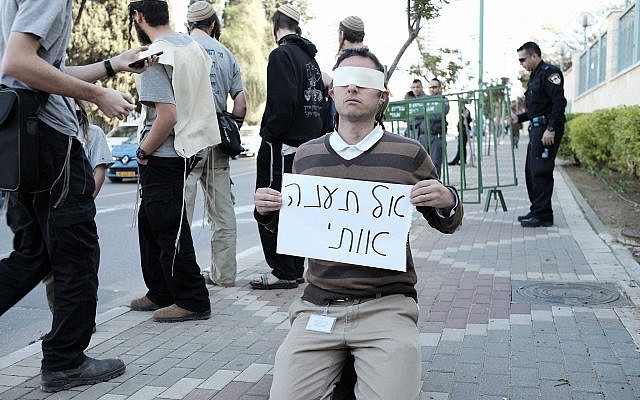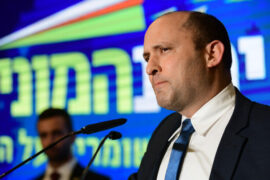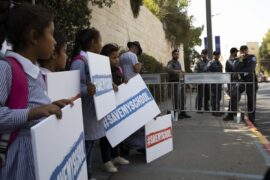An Israeli court issued harsh criticism last week against the Shabak security agency over its conduct while recently interrogating Jews held on suspicion of terrorism.
The district court ordered the Shabak to allow the suspects to receive eight consecutive hours of sleep during the night while they are in custody.
The suspects, Yaakov Donat and Ariel Dahari, were arrested two weeks ago but were only permitted to see a lawyer for the first time last Wednesday after a warrant preventing them from obtaining legal counsel had expired.
Both, together with a minor also being held by the Shabak, are accused of holding a knife in their possession, being members of a terror organization and planning to carry out an attack spurred by nationalist motives.
Donat and Dahari’s detentions have been extended until Monday, and the minor’s until Sunday, when the three should respectively be released unless their interrogators can succeed in compiling evidence against them.
Speaking at a hearing for the extension of the administrative detention despite the fact that no charges have been filed, Judge Ofir Katavi-Rivlin stated that the rights of the suspects “are being breached in the most fundamental way.”
Minutes of the hearing detail the hours during which one of the suspects was questioned, indicating that in addition to an interrogation that took place during the day, he was also interrogated periodically between the hours of 10pm to 4:30am.
Later that day, the same suspect was questioned again between 7:05pm and 4:30am, with the pattern continued for three days in an effort to break the suspect’s will through sleep deprivation.
Details of the court’s decision, as well as minutes from the discussion on their interrogation, were released following a request by journalists from several media outlets after a gag order had initially blocked the publication of any information connected to the case.
Although Judge Katavi-Rivlin granted permission to publish the details, the state appealed her decision regarding both the gag order and the order to allow the suspects a full night’s sleep.
Katavi-Rivlin approved keeping the suspects in detention despite the lack of evidence against them, but harshly criticized the Shabbak over the fact that interrogations were being conducted during the night, with interruptions, so that the suspects were unable to sleep without being constantly woken up and questioned.
“The suspect should be allowed continuous sleep at night of at least eight hours,” she wrote.
“A situation in which the suspect is not allowed continuous hours of sleep, and he is taken out of his cell in order to be interrogated in the middle of the night, is improper. I have not found any justification for this abusive manner of interrogation.”
Amir Brakha, attorney for the suspects, said that “things are becoming clearer,” adding that he believes that “this case will probably be closed very fast and the suspects will be released, and this can be gleaned from how pressured the investigative unit and the Shabak are – a pressure that led them to exhibit this extreme behavior.”
Detaining citizens without charge, obstructing their access to legal council and depriving them of sleep to obtain confessions is completely indefensible behavior that undermines Israel’s claim to be a democratic society.
While such methods should also be opposed when used against Palestinian suspects, a fundamental difference that shouldn’t go ignored is that the young Jews detained in this case are – unlike Palestinians – assumed to enjoy the protections of citizenship in a democratic state. And if we generally see a disparity between the treatment of Jewish and Palestinian prisoners by Israeli security forces, the disparity should be corrected by raising the moral standard for how the Shabak treats Palestinians and not by lowering the standard for how they treat Jewish prisoners.
It’s generally not productive to make small ideological groups feel like persecuted minorities. The behavior of the Shabak will likely only further radicalize young Jewish nationalists in the West Bank. Not just the activists who’ve been imprisoned without charges, deprived of sleep and tortured in basement interrogation rooms, but also the thousands of others who’ve begun to see themselves as living under a regime that regularly strips them of their rights.





